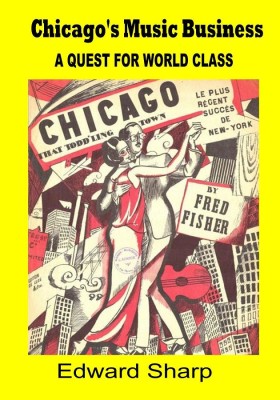Chicago's contribution to the American songbook is far greater than just the Blues or Jazz or Soul, the music genres which are most often associated with Chicago. Music that is deemed uniquely American - minstrel folk music, ragtime, jazz, blues, country music - all were spawned, nurtured and evolved between the Appalachian and the Rocky Mountains and then popularized by the music businesses of Chicago. From the patriotic songs of the Civil War to Gospel and Soul a century later, Chicago music businesses were making major contributions to American culture. The following is a representative sampling of this American music that was promoted by Chicago music businesses. It is not necessarily music by Chicago artists, although often it is, nor is it about Chicago, although some of it is; rather it is American music that came from Chicago music companies. The recordings were made in the acoustical era which were never as good as later electrical transcriptions and they only get worse with age but they do provide more authenticity. There are modern renditions of much of this music but the artists often changes the original to fit their preference or style. Click on the arrow symbol below the song description to hear the song.
Lorena
Chicago first became a national music production center in the late 1850's when a local music publisher had several hit songs by local composers, J.P. Webster and Henry C. Work. Webster's Lorena was embraced by soldiers on both sides of the Mason-Dixon Line who longed to be back with their love.
Tramp, Tramp, Tramp
Root & Cady became national powers with patriotic music during the Civil War but they also issued religious music, songbooks and music for minstrel shows
Kingdom's Coming
Root & Cady issued Henry Clay Work's Kingdom Coming in 1862 even as the Northern forces struggled. The song mocked the South using the melody from Dixieland to envisage the end of slavery. It became popular with Northern soldiers and slaves following Northern armies. The lyrics are hard to understand as it is in the assumed dialect of slaves.
Sweet By and By
The most enduring song issued from Chicago in the mid-nineteenth century era was J.P. Webster's Sweet By and By. It made the young Lyon and Healy music company a rising national power. The song is still a gospel standard.
Grandfather's Clock
The Great Chicago Fire and a national recession set back the development of Chicago's music industry. One of the last national hit songs to emanate from Chicago before the hiatus was Henry Clay Work's Grandfather's Clock. His Civil War songs are rarely recalled but not Grandfather's Clock which endures.
O Promise Me
The Gilbert & Sullivan style comic opera was successfully made into the American comic opera first in Chicago in the late 1880's. Theater historians deem Robin Hood, written by Chicagoans Smith and DeKoven, to be the first successful American comic opera. O' Promise Me from Robin Hood became immensely popular across America in performance at weddings and wedding anniversary events. It was the start of a Chicago musical tradition.
Send the Light
By the 1880's Chicago's music industry was in economic recovery with gospel or religious music as one of the most lucrative genres. Send the Light issued first in 1890 is still a popular hymn.
She is the Daughter of Officer Porter
George Schleiffarth was a prolific and popular composer of music in the last decades of the nineteenth century. Although none of his music has endured, he was important in helping revive Chicago's music industry. This recording dates from the earliest days of musical recording and is of very poor quality.
The Streets of Cairo or the Poor Little Maid
The Chicago World's Fair of 1893 provided a boost to Chicago's music industry and introduced one of the most recognizable melodies of all time.
My Girl from Dixie
Silas Leachman was Chicago's first recording artist and one of the earliest musicians to gain national celebrity via records. He was something of a human recording machine producing thousands of records but creating no original music of his own. He made so many recordings that they are not really rare today but occasionally are found on ebay or in antique stores.
I Love You Truly
In late Victorian America there were few successful female composers and even fewer successful female music entrepreneurs; yet there were two in Chicago. Anita Owen published her own music of which A Sweet Bunch of Daisies became a big hit and Carrie Jacobs-Bond published several huge hit songs that she had composed. I Love You Truly became another American wedding musical tradition.
A Lemon in the Garden of Love
At the very dawn of the twentieth century Chicago's musical theater industry took off providing many hit songs. This song, a big national hit, by Chicago authors Pixley and Luders was from the musical Burgomaster produced by the Dearborn Theater Company although the publisher was from Detroit.
I Wonder Who's Kissing Her Now
One Chicago theater company, the LaSalle, had over a dozen successful musical comedies in the first fifteen years of the new century. The song with the biggest national impact was this Joe Howard composition. He would start his own music company to serve the musical theater in Chicago.
St. Louis Tickle
A ragtime hit song written for the St. Louis Exposition of 1904 was issued by Chicago music publisher Victor Kremer and composed by Theron C. Bennett who worked on Kremer's staff. Kremer specialized in ragtime.
Dat Lovin' Rag
A hit song that came out of Chicago's first major Black theater, yet it was written by Whites. The Black and White music business in Chicago always has had been intertwined, a fact not commonly known.
Canadian Capers
This song was a big hit across America yet it was issued by a Chicago music company established by a Black musician from the South Side.
In the Bottoms (Juba Dance)
Yet another huge national hit song was the Juba, composed by a Black artist but issued by a Chicago music company that ordinarily specialized in religious music.
Meet Me Tonight in Dreamland
In the first decade of the twentieth century the Vaudeville circuits were at their height of popularity and prosperity. Music introduced in Vaudeville would be consumed in parlors across America providing a huge market for Chicago's Tin Pan Alley music companies. This song from the Will Rossiter music company was a huge bestseller.
Let Me Call You Sweetheart
An even bigger hit with the same composer and librettist was Let Me Call You Sweetheart, another song that was likely to be heard at a wedding celebration. In 1916, a recording of this song was added to the Library of Congress's National Registry of important recordings. In the first decades of the twentieth century, Americans were betrothed to music from Chicago. The song was issued from the Harold Rossiter music company.
Down by the Old Mill Stream
Many of the songs meant for Vaudeville and the family parlor are still played by harmony groups in competition. This song was written by Tell Taylor who owned his own music company in Chicago.
Some of These Days
Written by a Black songsmith for a White Vaudeville singer, this song became a huge hit and influenced other songwriters. It was published by the Will Rossiter music company which played a major role in the development of American music.
Darktown Strutter's Ball
Another big bestseller for the Will Rossiter company, Darktown Strutter's Ball was composed by Shelton Brooks who also had authored Some of these Days. Rossiter also published Jelly Roll Blues by Jelly Roll Morton. Rossiter was a pioneer of the Jazz Age of American music.
Shim-Me-Sha-Wabble
Flo Ziegfeld and other New York producers popularized the Shimmy after World War I but the music was created in Chicago before World War I. This seminal song was published by the Roger Graham music company which had also issued Canadian Capers. An influential company owned by an African-American.
Baby Won't You Please Come Home
Chicago's Tin Pan Alley music publishers often published works by Black artists but often ended up in disputes as to the true owner of the song. This song was published by a small Black-owned music business in Chicago but ownership was claimed by several musicians.
Kitten on the Keys
Player piano roll companies in Chicago also introduced popular music.
It Ain't Gonna Rain No Mo
The first song to become a national hit thanks to radio promotion. It launched Wendell Hall's career and made a small fortune for Chicago music publisher Fred Forster. The song was been categorized as early country music but it seems more a folk novelty song.
Wabash Blues
The big band era developed in Chicago and the bands of Chicago provided America with many hit songs.
Dawes' Melody
Even a Vice-President of the United States from Chicago could compose a hit song.
Doctor Jazz
Chicago's music companies started promoting Jazz before World War I but it was the 1920's that became known as the Jazz Age.
To learn more about Chicago's music history read Volume Two, Chicago's Music Business, in the Quest for World-Class series.

